八年级上册英语外研版新各模块知识点归纳总结
外研版八年级上册英语语法总结
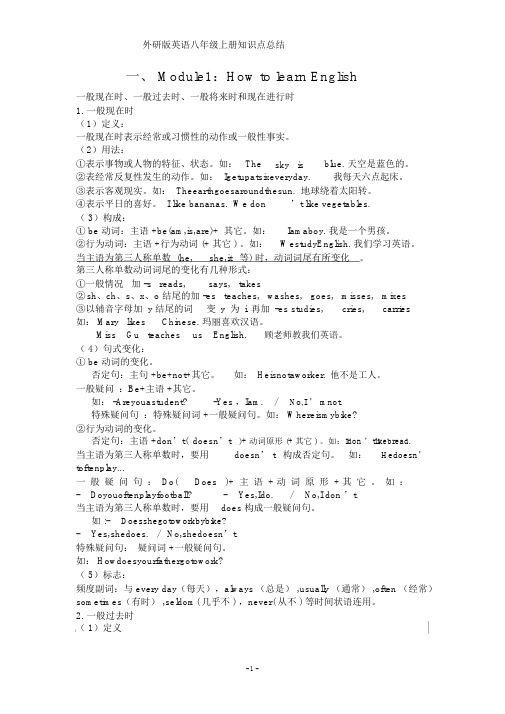
外研版英语八年级上册知识点总结一、 Module1:How to learn English一般现在时、一般过去时、一般将来时和现在进行时1.一般现在时(1)定义:一般现在时表示经常或习惯性的动作或一般性事实。
(2)用法:①表示事物或人物的特征、状态。
如: The sky is blue. 天空是蓝色的。
②表经常反复性发生的动作。
如: Igetupatsixeveryday.我每天六点起床。
③表示客观现实。
如: Theearthgoesaroundthesun. 地球绕着太阳转。
④表示平日的喜好。
I like bananas. We don’t like vegetables.( 3)构成:① be 动词:主语 +be(am,is,are)+ 其它。
如:Iamaboy. 我是一个男孩。
②行为动词:主语 +行为动词 (+ 其它 ) 。
如:WestudyEnglish. 我们学习英语。
当主语为第三人称单数 (he,she,it 等) 时,动词词尾有所变化。
第三人称单数动词词尾的变化有几种形式:①一般情况加 -s reads,says, takes②sh、ch、s、x、o 结尾的加 -es teaches, washes, goes, misses, mixes③以辅音字母加 y 结尾的词变y为i再加-es studies,cries,carries如: Mary likes Chinese. 玛丽喜欢汉语。
Miss Gu teaches us English.顾老师教我们英语。
( 4)句式变化:① be 动词的变化。
否定句:主句 +be+not+其它。
如:Heisnotaworker.他不是工人。
一般疑问:Be+主语 +其它。
如: -Areyouastudent?-Yes ,Iam. /No,I ’ mnot.特殊疑问句:特殊疑问词 +一般疑问句。
如: Whereismybike?②行为动词的变化。
外研版英语八年级上册module 单元知识点归纳总结(详细版)
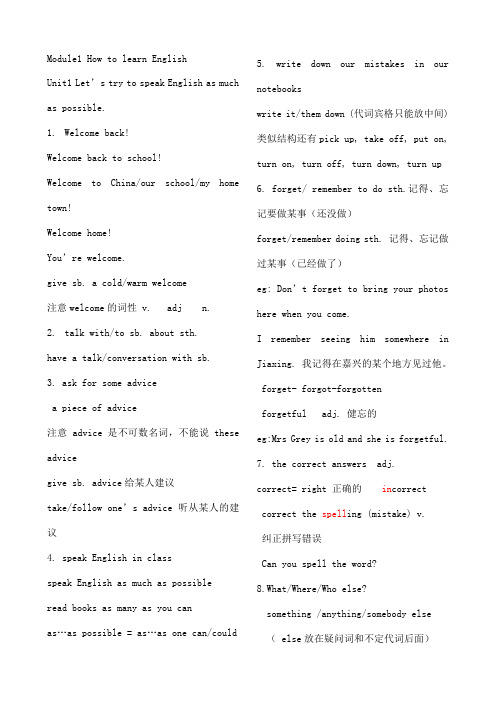
Module1 How to learn EnglishUnit1 Let’s try to speak English as much as possible.1.Welcome back!Welcome back to school! Welcome to China/our school/my home town!Welcome home!You’re welcome.give sb. a cold/warm welcome注意welcome的词性 v. adj n.2.talk with/to sb. about sth.have a talk/conversation with sb.3. ask for some advicea piece of advice注意advice是不可数名词,不能说these advicegive sb. advice给某人建议take/follow one’s advice听从某人的建议4. speak English in classspeak English as much as possible read books as many as you canas…as possible = as…as one can/could 5. write down our mistakes in our notebookswrite it/them down (代词宾格只能放中间) 类似结构还有pick up, take off, put on, turn on, turn off, turn down, turn up 6. forget/ remember to do sth.记得、忘记要做某事(还没做)forget/remember doing sth. 记得、忘记做过某事(已经做了)eg: Don’t forget to bring your photos here when you come.I remember seeing him somewhere in Jiaxing. 我记得在嘉兴的某个地方见过他。
最新外研版英语八年级上册知识点总结(精华版)

最新外研版英语八年级上册知识点总结(精华版)作者:邓华Module 1 How to learn English一.重点短语:try to do sth. 尝试做某事a piece of advice一条建议make a mistake犯错误three pieces of paper三张纸give sb. some advice给某人一些建议advise sb. to do sth. 建议某人去做某事write it down写下,记下this term这学期next term下学期ask for advice征求意见basic questions基本问题the meaning of……的意思talk to sb. 跟某人谈话write to sb. 写信给某人start a conversation开始一段谈话talk about sth. with sb.跟某人谈论某事as much / many as possible尽可能多地help sb.(to) do / with sth. 帮助某人做某事二.固定结构:1. practise doing sth. 练习做某事2. a number of +可数名词复数+V(复数)许多、很多3. the number of+可数名词复数+V(单数)……的数量9. one or two days一两天10. a (good ) way to do sth to do sth.做某事的(好)方法11. something new/old/interesting新/旧/有趣/的东西12. What about doing=How about doing…?做……怎么样?三.重点句型:1.What else? 还有什么其它的?2 It’s a good idea to do sth. 做…..是个好主意3. It is adj. + (for sb.) + to do sth. (对某人来说)做某事怎么样4. It is + adj. (形容词)+ (of sb.) to do sth.某人做某事某人怎么样. It is very kind of you to help me.你能帮我你真好。
最新外研版英语八年级上册知识点总结(精华版)
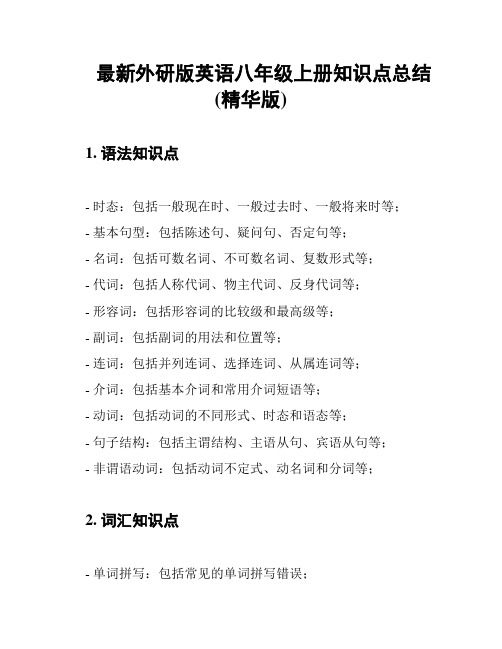
最新外研版英语八年级上册知识点总结
(精华版)
1. 语法知识点
- 时态:包括一般现在时、一般过去时、一般将来时等;
- 基本句型:包括陈述句、疑问句、否定句等;
- 名词:包括可数名词、不可数名词、复数形式等;
- 代词:包括人称代词、物主代词、反身代词等;
- 形容词:包括形容词的比较级和最高级等;
- 副词:包括副词的用法和位置等;
- 连词:包括并列连词、选择连词、从属连词等;
- 介词:包括基本介词和常用介词短语等;
- 动词:包括动词的不同形式、时态和语态等;
- 句子结构:包括主谓结构、主语从句、宾语从句等;
- 非谓语动词:包括动词不定式、动名词和分词等;
2. 词汇知识点
- 单词拼写:包括常见的单词拼写错误;
- 同义词:包括一些常见的同义词辨析;
- 常用短语:包括日常交际中常用的短语;
- 常用惯用语:包括一些惯用语的正确使用;
3. 阅读技巧
- 阅读理解:包括快速阅读和细节理解;
- 阅读速度:包括提高阅读速度和理解能力的方法;
- 阅读技巧:包括推测词义、寻找关键词等技巧;
4. 写作技巧
- 书信写作:包括格式、语言表达和常用句型等;
- 日记写作:包括表达个人感受和经历的方法;
- 作文写作:包括如何组织思路和提高写作水平的方法;
以上是最新外研版英语八年级上册的知识点总结,希望对你的研究有所帮助。
八年级上册英语外研版(新)各模块知识点归纳总结2015-1-9
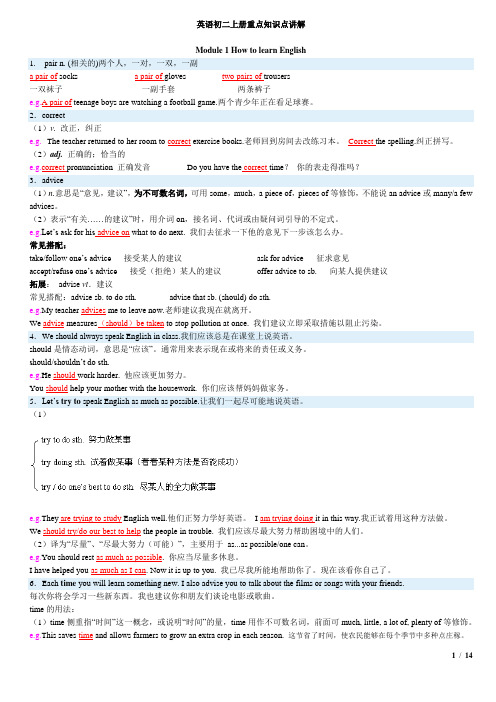
英语初二上册重点知识点讲解Module 1 How to learn English1.pair n. (相关的)两个人,一对,一双,一副a pair of socks a pair of gloves two pairs of trousers一双袜子一副手套两条裤子e.g.A pair of teenage boys are watching a football game.两个青少年正在看足球赛。
2.correct(1)v. 改正,纠正e.g. The teacher returned to her room to correct exercise books.老师回到房间去改练习本。
Correct the spelling.纠正拼写。
(2)adj.正确的;恰当的e.g.correct pronunciation 正确发音Do you have the correct time?你的表走得准吗?3.advice(1)n.意思是“意见,建议”,为不可数名词,可用some,much,a piece of,pieces of等修饰,不能说an advice或many/a few advices。
(2)表示“有关……的建议”时,用介词on,接名词、代词或由疑问词引导的不定式。
e.g.Let’s ask for his advice on what to do next. 我们去征求一下他的意见下一步该怎么办。
常见搭配:take/follow one’s advice接受某人的建议ask for advice 征求意见accept/refuse one’s advice接受(拒绝)某人的建议offer advice to sb. 向某人提供建议拓展:advise vt.建议常见搭配:advise sb. to do sth. advise that sb. (should) do sth.e.g.My teacher advises me to leave now.老师建议我现在就离开。
外研版英语八年级上册所有知识点总结

• 15.all the time 一直
Module1——重点句型
• 一、提建议的句子: • 1.You(We) should do sth • 2.Let’s do sth • 3.Why not do sth • 4.Why don’t you(we) do sth • 5.How(What) about doing
• …for …有什么用
• 4. arrive at 到达(后接小地点) • 15. take…out of… 从…拿
• 5. once or twice 偶尔,一两次
出…
• 6. go off (灯)熄灭,(闹钟)响起 • 16. go across the road=
• 7.remember to do sth 记得去做某事
• 8. in the east of 在……的东部 • 9.be famous for=be known for • 因……而闻名 • 10.such as 比如 • lions of 数百万的 • 12.on the coast 在海滨,在海岸 • 13.be popular for 因…而受欢
• 7. on one’s way to…
• cross the road 过马路
• 在某人去…的路上
• 17. see/watch/hear sb do sth
• 8. run after 追逐,追赶
看见/听见某人做过某事
• 9. stop doing sth 停止做某事 • see/watch/hear sb doing sth • 看见/听见某人正在做某事
Module 8 重点词组
• 1. in time 及时 • 2. fall off… 从…跌落 • 3. pay attention 注意 • 4. pay attention to doing sth
外研八年级上知识总结

外研八年级上知识总结一、重要短语1. more and more 越来越多2. in the future 在未来3. do shopping 购物4. at the weekend 在周末5. get up 起床6. do homework 做作业7. go to bed 上床睡觉8. go to the cinema 去看电影9. on the/a weekend 在周末10. in a week 在一周内二、重点句型1. It will be + 形容词 + in + 时间段 + 表示未来某个时间点之前会发生的情况。
2. What will you do + 时间点?你将在什么时候做什么?3. How will you go to + 地点?你将如何去某地?4. Let’s + 动词原形 + 表示建议或提议。
5. What are you doing + 时间点?你正在做什么?6. When are you going + 动词不定式?你打算什么时候做某事?7. How long will it take you to do sth?做某事需要多长时间?8. It takes sb some time to do sth某人花费一些时间做某事。
9. I’m sorry to hear that听到这个消息我很难过。
10. I hope to do sth我希望做某事。
三、语法重点1. 将来时态的构成和用法。
2. 宾语从句的用法,包括连接词和语序。
3. 情态动词的用法,包括can、may、must等。
4. 现在完成时的用法,包括have/has been和have/has done的区别。
5. 形容词的比较级和最高级的用法。
6. 反身代词的用法,包括强调主语和表示强调等。
(外研版)初中英语八年级上册知识点归纳总结
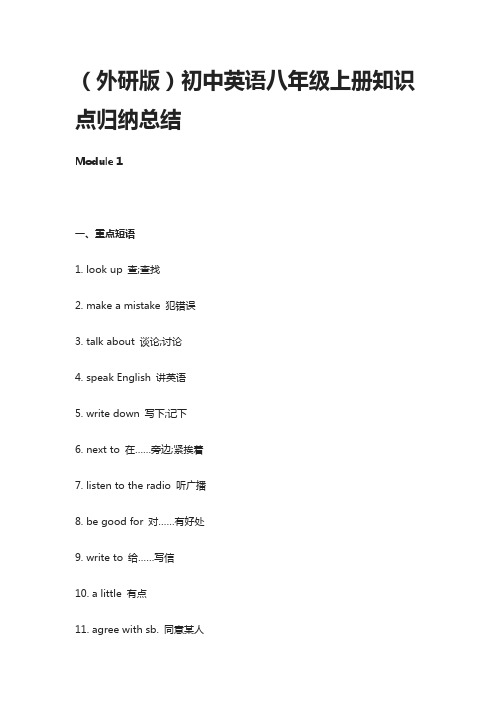
(外研版)初中英语八年级上册知识点归纳总结Module 1一、重点短语1. look up 查;查找2. make a mistake 犯错误3. talk about 谈论;讨论4. speak English 讲英语5. write down 写下;记下6. next to 在……旁边;紧挨着7. listen to the radio 听广播8. be good for 对……有好处9. write to 给……写信10. a little 有点11. agree with sb. 同意某人12. talk to 跟……交谈13. send sth. to sb. 把某物(发)送给某人14. ask for 请求15. watch films 看电影16. be from 来自17. smile at 冲……微笑18. go to bed 去睡觉19. get up 起床20. think about 考虑21. make friends with sb. 与某人交朋友22. take sb. around sp. 带领某人参观某地23. a few 几个;一些24. invite sb. to 邀请某人到……25. be good at 擅长26. for example 例如二、重点句型1. advise sb to do sth 建议某人做某事2. be afraid to... 害怕做……3. be good for... 对……有好处的4. be (a) great way(s) to do sth 做……的(一种)好方法5. It is natural to do sth. 做某事是合乎常情的。
三、重点语法1. Why not...? = Why don’t + you (we / they...)...?意为“为什么不……呢?”,后接动词原形。
eg:Why not / Why don’t we help the old cleantheir rooms this afternoon?今天下午为什么不去帮助老人打扫房间呢?2. What / How about...? 意为“……怎么样?”,其中about 是介词,后接名词或动词-ing 形式。
- 1、下载文档前请自行甄别文档内容的完整性,平台不提供额外的编辑、内容补充、找答案等附加服务。
- 2、"仅部分预览"的文档,不可在线预览部分如存在完整性等问题,可反馈申请退款(可完整预览的文档不适用该条件!)。
- 3、如文档侵犯您的权益,请联系客服反馈,我们会尽快为您处理(人工客服工作时间:9:00-18:30)。
英语初二上册重点知识点讲解Module 1 How to learn English1.pair n. (相关的)两个人,一对,一双,一副a pair of socks一双袜子 a pair of gloves一副手套two pairs of trousers两条裤子e.g.A pair of teenage boys are watching a football game. 两个青少年正在看足球赛。
2.correct(1)v. 改正,纠正e.g.The teacher returned to her room to correct exercise books. 老师回到房间去改练习本。
Correct the spelling. 纠正拼写。
(2)adj.正确的;恰当的e.g.correct pronunciation 正确发音Do you have the correct time?你的表走得准吗?3.advice(1)n.意思是“意见,建议”,为不可数名词,可用some,much,a piece of,pieces of等修饰,不能说an advice或many/a few advices。
(2)表示“有关……的建议”时,用介词on,接名词、代词或由疑问词引导的不定式。
e.g.Let’s ask for his advice on what to do next. 我们去征求一下他的意见下一步该怎么办。
常见搭配:take/follow one’s advice接受某人的建议ask for advice 征求意见accept/refuse one’s advice接受(拒绝)某人的建议offer advice to sb. 向某人提供建议拓展:advise vt.建议常见搭配:advise sb. to do sth.advise that sb. (should) do sth.e.g.My teacher advises me to leave now. 老师建议我现在就离开。
We advise measures(should)be taken to stop pollution at once.我们建议立即采取措施以阻止污染。
4.We should always speak English in class.我们应该总是在课堂上说英语。
should是情态动词,意思是“应该”。
通常用来表示现在或将来的责任或义务。
should/shouldn’t do sth.e.g.He should work harder. 他应该更加努力。
You should help your mother with the housework. 你们应该帮妈妈做家务。
5.Let’s try to speak English as much as possible. 让我们一起尽可能地说英语。
(1)e.g.They are trying to study English well. 他们正努力学好英语。
I am trying doing it in this way. 我正试着用这种方法做。
We should try/do our best to help the people in trouble. 我们应该尽最大努力帮助困境中的人们。
(2)译为“尽量”、“尽最大努力(可能)”,主要用于as...as possible/one can。
e.g.You should rest as much as possible. 你应当尽量多休息。
I have helped you as much as I can. Now it is up to you.我已尽我所能地帮助你了。
现在该看你自己了。
6.Each time you will learn something new. I also advise you to talk about the films or songs with your friends.每次你将会学习一些新东西。
我也建议你和朋友们谈论电影或歌曲。
time的用法:(1)time侧重指“时间”这一概念,或说明“时间”的量,time用作不可数名词,前面可much, little, a lot of, plenty of等修饰。
e.g.This saves time and allows farmers to grow an extra crop in each season.这节省了时间,使农民能够在每个季节中多种点庄稼。
(2)当作“次数;倍数”讲时,time是可数名词。
e.g.I have been to Beijing three times. 我去过北京三次。
(3)time构成的短语:at a time一次,每一次at one time曾经,一度at times /from time to time有时,偶尔all the time总是,一直in time及时,迟早on time准时(4)time构成的句型:① It’s time for sb. to do sth./It’s (high) time sb. did sth. 该是某人干……的时间了。
e.g.It’s time for children to go to bed. 是小孩睡觉的时候了。
It’s high time that we started. 我们该出发了。
② each time(每次),next time(下次),the first/last time(第一次/最后一次……的时候)等词组引导的时间状语从句。
e.g.The last time I went to China, I visited Shanghai. 我上次到中国时,游览了上海。
14.I suggest you write four or five words a day on pieces of paper and place them in your room. 我建议你一天把四个或者五个单词写在纸上并且放在你的房间里。
suggest,做动词,表示“建议,提议”的意思,对应的名词是suggestion。
suggest的用法:e.g.She suggested an early start. 她建议早一点出发。
I suggested his / him giving up the foolish idea. 我建议他放弃那愚蠢的念头。
She suggested that the class meeting (should) not be held on Saturday.她建议班会不要在星期六举行。
注意:当suggest表示“暗示,表明”的意思,它后面接宾语从句,谓语用真实的时态,而不用“should+动词原形”。
e.g.他脸上的表情表明他很开心。
(×)The expression on his face suggested that he should be very happy.(√)The expression on his face suggested that he was very happyModule 2 My home town and my country1.It is on the River Cam and has a population of about 120,000.它(剑桥)位于康河河畔,人口约为12万。
population n. 意思是“人口,居民”,它是一个集体名词,它的用法有时较为特殊, 所以很容易用错。
① population常与定冠词the连用,作主语用时,谓语动词常用第三人称单数形式。
e.g.The world’s population is increasing faster and faster. 全世界的人口增长得越来越快。
②当主语是表示“人口的百分之几、几分之几”时,谓语动词用复数形式。
e.g.About seventy percent of the population in China are farmers.中国大约有百分之七十的人口是农民。
③有时population可用作可数名词,其前可用不定冠词。
e.g.China has a population of about 1.3 billion. =There is a population of about 1.3 billion in China. 中国大约有十三亿人口。
④表示人口的“多”或“少”,不用“much”或“little”,而要用“large”或“small”。
e.g.India has a large population. 印度人口众多。
Singapore has a small population. 新加坡人口少。
⑤询问某国、某地有多少人口时,不用“How much...?”,而用“How large...?”。
在问具体人口时用“What...?”。
e.g.—What is the population of Canada?= How large is the population of Canada?加拿大的人口有多少?—The population of Canada is about 29 million. 加拿大的人口大约有二千九百万。
2.It has a population of about seven and a half million, so it is bigger and busier than Cambridge. 它(伦敦)大约有750万人口,所以比剑桥更大更繁忙。
(1)million是数词,意思是“百万”。
它的用法如下:①当与具体数字连用时,习惯上用单数,而且也不后接介词of。
e.g.three million people 三百万人He was prepared to pay two million. 他愿意支付200万。
但是,后面的名词有了the, these, those等特指限定词修饰时,或其后的接的是us, them 这样的人称代词时,则此时必须用介词of。
e.g.About three million of them have left there. 他们当中约有三百万人离开了那儿。
②当不与具体数字连用,而是表示不确定的泛指数时,则不仅要用复数,而且要后接介词of,然后才能接名词。
e.g.A careless mistake cost the company millions of pounds.一个粗心的错误使公司蒙受数百镑的损失。
